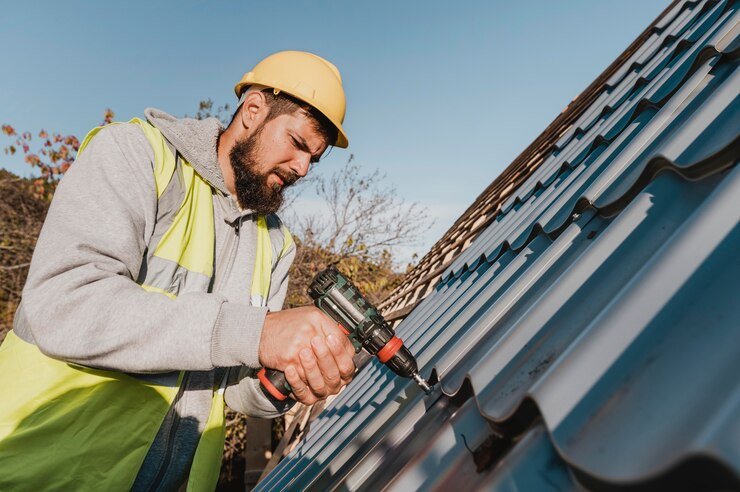Roofing contractors play a critical role in successfully installing, maintaining, and repairing commercial roofs. A commercial roof protects the structure and valuable assets within the building, including inventory, equipment, and personnel. With their knowledge and experience, roofing contractors ensure that the roofing system meets the needs of the business, the climate, and local building codes. We will explore the vital responsibilities of roofing contractors, from installation to long-term maintenance, and examine the key factors businesses should consider when hiring a contractor for their commercial roofing projects.
Roof Installation: Laying the Foundation for Long-Term Protection
The first and most crucial task for roofing contractors is to ensure the roof installation is done correctly. A commercial roof is a significant investment for any business, and its installation must be executed precisely. Contractors assess the specific needs of the building, taking into consideration factors such as roof type, size, materials, and local weather conditions. With their understanding of various roofing systems, they can recommend the most suitable options, such as flat roofs, sloped roofs, or green roofs, depending on the business’s preferences and local regulations.
The installation involves preparing the roof deck, ensuring proper insulation, and applying the roofing material. Roofing contractors are responsible for ensuring that the roof’s foundation is solid, which includes addressing issues like structural integrity, drainage systems, and ventilation. The roof’s waterproofing capabilities are also a significant consideration. During installation, contractors follow industry standards and manufacturer instructions to ensure that all materials are applied correctly and that the roof can withstand the rigors of time, weather, and heavy use.
Routine Maintenance: Ensuring Longevity and Functionality
Once a commercial roof is installed, the next critical responsibility of roofing contractors is ongoing maintenance. Routine roof inspections are necessary to detect potential issues before they become significant problems. Roofing contractors provide a service that includes periodic inspections to identify wear and tear, damage from storms or debris, and any structural concerns that could compromise the roof’s performance. Regular maintenance ensures that small issues are addressed before they escalate into costly repairs or replacements.
During maintenance visits, contractors will check the roof’s surface for cracks, leaks, or other forms of deterioration. They will also assess flashing, seams, and joints, which are often points of vulnerability. Additionally, roofing contractors will inspect the drainage systems to ensure that water does not accumulate on the roof, as stagnant water can lead to leaks or roof collapse. By maintaining the roof’s integrity, roofing contractors help businesses avoid unplanned expenses and disruptions to their daily operations, keeping the roof in optimal condition for many years.
Roof Repairs: Addressing Issues Before They Escalate
Despite regular maintenance, some issues may arise that require immediate attention. Roofing contractors are crucial in identifying and repairing roof damage, ensuring the building remains protected. Whether it’s a leaking roof caused by storm damage or wear over time, quick and effective repairs can prevent further damage to the property. Contractors are skilled in diagnosing the root cause of the issue and using the appropriate materials and techniques to fix it.
In cases of significant damage, roofing contractors will assess the situation and recommend the most effective repair options. Depending on the severity of the damage, repairs may involve patching leaks, replacing damaged sections of the roof, or addressing issues with the underlying structure. Contractors are equipped to handle these repairs with minimal disruption to the business, ensuring that the roof remains functional and secure.
Selecting the Right Roofing Materials: A Key Consideration for Contractors
One of the most essential roles roofing contractors play is guiding businesses in selecting the right roof materials. The choice of materials significantly impacts the roof’s longevity, durability, and energy efficiency. Commercial roofs can be made from various materials, including asphalt shingles, metal, TPO (thermoplastic olefin), EPDM (ethylene propylene diene monomer), and more. Each material offers distinct benefits, such as weather resistance, energy efficiency, or cost-effectiveness, which roofing contractors can help businesses evaluate.
The material choice also depends on the building’s purpose and location. For example, a warehouse might require a durable, low-maintenance roofing system, while an office building might prioritize energy efficiency or aesthetic appeal. Roofing contractors understand which materials work best in specific environments and climates, ensuring that the roof will not only last but also meet the business’s needs in terms of performance and appearance. By advising on the most suitable options, roofing contractors help businesses make informed decisions about their roofing investment.
Understanding Local Codes and Regulations: Compliance and Safety
Roofing contractors also play a key role in ensuring commercial roofs comply with local building codes and regulations. These codes are designed to ensure that roofs are installed and maintained in a way that meets safety standards and withstands local environmental conditions. Contractors are familiar with the codes and can navigate the permitting process, helping businesses avoid fines or complications during the installation or maintenance of the roof.
Local weather conditions also significantly influence these regulations. In areas prone to heavy snow, high winds, or extreme heat, roofing contractors understand the specifications for roofing materials, insulation, and structural requirements. Compliance with local codes ensures that the roof will perform as expected, minimizing risks to the building and its occupants.
Roofing contractors play an essential role in installing, maintaining, repairing, and replacing commercial roofs. Their responsibilities extend beyond just putting a roof over the building; they ensure the roof is durable, functional, and compliant with all necessary regulations. Whether it’s advising on the right materials, providing ongoing maintenance, or responding to emergencies, roofing contractors are integral to protecting commercial properties. By choosing a reliable contractor, businesses can ensure that their roofs serve as a long-lasting, dependable asset for years.
